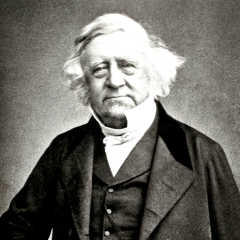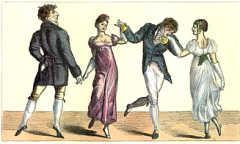Gryll Grange,

Thomas Love Peacock
published in 1861, was the seventh and last novel of Thomas Love Peacock, one of my favourite authors. Chapter XXIII contains some
passages about and observations on the game of Quadrille, which in the course of the 19th century been so eclipsed by Whist as to be
now considered old-fashioned. I find myself very much in tune with Peacock, and some of the critical social comments he makes about
Whist I can happily endorse in respect of Bridge.
The following scene takes place between Mr Gryll, eponymous owner of the Grange; Miss Ilex, an 'elderly spinster, who passed more than half her life in visits, and was everywhere welcome'; the Rev Dr Opimian, 'a genial gourmet'; and Mr Macborrowdale, 'an old friend of Mr. Gryll, a gentleman who comprised in himself all that Scotland had ever been supposed to possess of mental, moral, and political philosophy'.
Amongst the winter evenings' amusements
were two forms of quadrille:

Dancing the quadrillethe old-fashioned game of cards, and the more recently fashionable
dance. On these occasions it was of course a carpet-dance.
Now, dancing had never been in Mr. Falconer's line, and though modern dancing,
especially in quadrilles, is little more than walking, still in that 'little more' there is ample room for grace and elegance of motion…
In the meantime, Mr. Gryll had got up at a card-table, in the outer, which was the smaller drawing-room, a quadrille party of his own,
consisting of himself, Miss Ilex, the Reverend Dr. Opimian, and Mr. MacBorrowdale.
Mr Gryll. - This is the only game of cards that ever pleased me. Once it was the great evening charm of the whole nation. Now, when cards are played at all, it has given place to whist, which, in my younger days, was considered a dry, solemn, studious game, played in moody silence, only interrupted by an occasional outbreak of dogmatism and ill humour. Quadrille is not so absorbing but that we may talk and laugh over it, and yet is quite as interesting as anything of the kind has need to be.
Miss Ilex - I delight in quadrille. I am old enough to remember when, in mixed society in the country, it was played every evening by some of the party. But Chaque âge a ses plaisirs, son esprit, et ses moeurs. [Boileau, L'Art poétique, 1674] It is one of the evils of growing old that we do not easily habituate ourselves to changes of custom. The old, who sit still while the young dance and sing, may be permitted to regret the once always accessible cards, which, in their own young days, delighted the old of that generation: and not the old only.
The Rev. Dr. Opimian - There are many causes for the diminished attraction of cards in evening society. Late dinners leave little evening. The old time for cards was the interval between tea and supper. Now there is no such interval, except here and there in out-of-the-way places, where, perhaps, quadrille and supper may still flourish, as in the days of Queen Anne. Nothing was more common in country towns and villages, half-a-century ago, than parties meeting in succession at each other's houses for tea, supper, and quadrille. How popular this game had been, you may judge from Gay's ballad, which represents all classes as absorbed in quadrille. [He quotes stanzas VI and VII from Congreve's Ballad on Quadrille - see below] Then the facility of locomotion dissipates, annihilates neighbourhood. People are not now the fixtures they used to be in their respective localities, finding their amusements within their own limited circle. Half the inhabitants of a country place are here to-day and gone to-morrow. Even of those who are more what they call settled, the greater portion is less, probably, at home than whisking about the world. Then, again, where cards are played at all, whist is more consentaneous to modern solemnity: there is more wiseacre-ism about it: in the same manner that this other sort of quadrille, in which people walk to and from one another with faces of exemplary gravity, has taken the place of the old-fashioned country-dance. 'The merry dance, I dearly love' would never suggest the idea of a quadrille, any more than 'merry England' would call up any image not drawn from ancient ballads and the old English drama.
Mr. Gryll - Well, doctor, I intend to have a ball at Christmas, in which all modes of dancing shall have fair play, but country-dances shall have their full share.
The Rev. Dr. Opimian - I rejoice in the prospect. I shall be glad to see the young dancing as if they were young.
Miss Ilex - The variety of the game called tredrille - the Ombre of Pope's Rape of the Lock -is a pleasant game for three. Pope had many opportunities of seeing it played, yet he has not described it correctly; and I do not know that this has been observed.
The Rev. Dr. Opimian - Indeed, I never observed it. I shall be glad to know how it is so.
Miss Ilex - Quadrille is played with forty cards: tredrille usually with thirty: sometimes, as in Pope's Ombre, with twenty-seven. In forty cards, the number of trumps is eleven in the black suits, twelve in the red: in thirty, nine in all suits alike. In twenty-seven, they cannot be more than nine in one suit, and eight in the other three. In Pope's Ombre spades are trumps, and the number is eleven: the number which they would be if the cards were forty. If you follow his description carefully, you will find it to be so.
Mr. MacBorrowdale - Why, then, we can only say, as a great philosopher said on another occasion: The description is sufficient 'to impose on the degree of attention with which poetry is read.'
A Ballad on Quadrille
by William Congreve
I.
When as Corruption hence did go,
And left the Nation free;
When Ay said Ay, and No said No.
Without or Place or Fee;
Then Satan, thinking Things went ill,
Sent forth his Spirit call'd Quadrille.
Quadrille, Quadrille, &c.
II.
Kings, Queens and Knaves, made up his Pack,
And four fair Sutes he wore;
His Troops they were with red and black
All blotch'd and spotted o're;
And ev'ry House, go where you will,
Is haunted by this Imp Quadrille, &c.
III.
Sure Cards he has for ev'ry Thing,
Which well Court-cards they name,
And Statesman-like, calls in the King,
To help out a bad Game;
But if the Parties manage ill,
The King is forc'd to lose Codille, &c.
IV.
When two and two were met of old,
Tho' they ne'er meant to marry,
They were in Cupid 's Books enroll'd,
And call'd a Party Quarree;
But now, meet when and where you will.
A Party Quarree is Quadrille, &c.
V.
The Commoner, the Knight, and Peer,
Men of all Ranks and Fame,
Leave to their Wives the only Care
To propagate their Name;
And well that Duty they fulfil,
When the good Husband's at Quadrille, &c.
VI.
When Patients lie in piteous Case,
In comes the Apothecary;
And to the Doctor cries, Alas!
Non debes Quadrillare:
The patient dies without a Pill,
For why? the Doctor's at Quadrille, &c.
VII.
Should France and Spain again grow loud,
The Muscovite grow louder;
Britain to curb her Neighbours proud,
Would want both Ball and Powder;
Must want both Sword and Gun to kill;
For why? The General's at Quadrille, &c.
VIII.
The King of late drew forth his Sword,
(Thank God 'twas not in Wrath)
And made, of many a Squire and Lord,
An unwash'd Knight of Bath :
What are their Feats of Arms and Skill?
They're but nine Parties at Quadrille, &c.
IX.
A Party late at Cambray met,
Which drew all Europe's Eyes
'Twas call'd in Post-Boy and Gazette
The Quadruple Allies;
But some-body took something ill,
So broke this Party at Quadrille, &c.
X.
And now, God save this noble Realm.
And God save eke Hanover;
And God save those who hold the Helm,
When as the King goes over;
But let the King go where he will,
His Subjects must play at Quadrille.
Quadrille, Quadrille, &c.